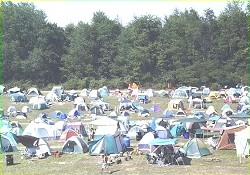DRCNet
Book
Review:
"Burning
Rainbow
Farm:
How
a
Stoner
Utopia
Went
Up
in
Smoke,"
by
Dean
Kuipers
(2006,
Bloomsbury
Press,
$24.95
HB)
6/9/06
Phillip S. Smith, Writer/Editor, [email protected], 6/9/06 Rainbow Farm was the culmination of Tom Crosslin's life's work. Located in rural Cass County, Michigan, just across the state line from Elkhart, Indiana, in a region known by locals as "Michianna," for a handful of years in the late 1990s, Rainbow Farm was a focal point of that rural Midwest subcultural sphere where marijuana activists mingled with militia men, factory workers and farmers partied with bikers and Rainbow Tribers (no relation), and everyone agreed that puritanical drug warriors and their laws could go to hell.
I wrote about the killings at Rainbow Farm when they happened, and the following weekend, I hopped in a rental car and drove 14 hours from Washington to attend Crosslin's funeral. The sorrow, anger, and bitterness were palpable as hundreds of people showed up to pay their respects to a man whose drive and ambition made Rainbow Farm a center for countercultural activism. Rainbow Farm threatened to become a rallying cry for a militant Midwest anti-establishment marijuana culture and Crosslin and Rohm were martyrs for the cause. But the timing was bad. Just a couple of days after Crosslin's funeral, two airliners hijacked by Arab fundamentalists crashed into the Twin Towers of the World Trade Center and a third hit the Pentagon. Like everything else, the killings at Rainbow Farm vanished in the glare of the burning buildings in Washington and New York. The 911 attacks also made people queasy about supporting Crosslin and Rohm. Hadn't they taken up arms against the legitimate government? And weren't there some murky links between Rainbow Farm and those angry, disaffected rural white guys tromping around the woods with guns and calling themselves militia men? In the five years since the bloody end to Rainbow Farm, the killings have vanished down the collective national memory hole -- although not the memories of the thousands upon thousands of people who attended the hemp fests there over the years and found a home where goodhearted people could share some music and some weed and dare to dream of a time when they didn't have to fear losing their jobs, their kids, their homes, and their freedom because they liked to smoke dope. But while America has been busy forgetting, Cass County native and Los Angeles City Beat deputy editor Dean Kuipers was busy researching and remembering.
Crosslin came out of a milieu of broken families, hard drinking, and hard work, bar fights and motorcycle clubs, and Kuiper tells the story of his transformation from just another factory rat into a dedicated pot lover and activist. In doing so, Kuipers deftly lifts a lid on the strange currents wafting across the Midwest in the 1980s and 1990s: A sullen defiance of a renewed War on Drugs combined with a growing skepticism and even fear of a federal government that seemed increasingly imperial, a rising rural marijuana culture infected with people convinced the deaths of the Branch Davidians in Waco was a signal of imminent end times, a dying factory economy where long-time industrial workers were having to choose between their herb and their jobs and looking for villains for their plight. But that's only half the equation. Kuipers also explicates the growing harshness of the drug war in the Reagan 1980s and the particular paranoia looming law enforcement created in small town America. It really is different from the big cities on the coasts. Like much of the country's interior, Crosslin's Michianna was a place where an anonymous tip that you smoked pot was good enough to get a warrant and you were likely to wake up at dawn with a SWAT team rifle pointed at your head. And thanks to the energetic use of asset forfeiture laws, especially by Michigan authorities, you were likely to lose your home as well as your freedom. The forces of law and order collided with the forces of fun, liberation, and weed that Labor Day weekend at Rainbow Farm. The result was a true American tragedy. In that sense, "Burning Rainbow Farm" is larger than Tom Crosslin or Scott Teter or the marijuana movement or the war on drugs. Kuipers has constructed a classic tale of the eternal conflict at the root of America's soul, the conflict between freedom and order, Puritanism and libertinism. It is a conflict that has played out repeatedly in our country's long history and plays out daily on the street and in the courtrooms of the land. The forces of law and order won at Rainbow Farm and they win day after day in countless small victories, countless people imprisoned for the weed, countless lives ruined for the sake of a chimera -- keeping America drug-free. But the mindless forces of order also breed rebellion and resistance. One can only hope that one day, too many people will have been hurt, oppressed, and persecuted to allow the war on marijuana to continue. But the story of Rainbow Farm is a cautionary tale. Tom Crosslin and Rollie Rohm were ready to die for their cause rather than fall into the hands of a vengeful state. But now they're dead, and the state and marijuana prohibition live on. Perhaps the best way to honor their memory -- other than trying Scott Teter for war crimes -- is to redouble our efforts to legalize the weed by any peaceful means necessary. Crosslin and Rohm are indeed martyrs, misguided perhaps, but true martyrs, and they deserve to be honored. "Burning Rainbow Farm" is a real winner, and Dean Kuipers has done justice to his subjects. Kuipers brings to vivid life the life and times of Rainbow Farm, cleanly situates it within the broader social trends afoot, and unflinchingly tells the story of the trajectory of tragedy. The war on drugs creates not only martyrs, but an awful lot of walking wounded. This book is not just about Tom Crosslin and Rollie Rohm; it's about all of us. (Get your copy of Rainbow Farm and support the cause by donating to DRCNet -- see our offer below -- other membership premiums continue to be available too.)
|


